Hygiene Factors & Intention to Leave
VerifiedAdded on 2019/09/30
|56
|9549
|514
Report
AI Summary
This report investigates the impact of hygiene factors on employee intention to leave, focusing on MI Home Care. Utilizing Herzberg's Two-Factor Theory, it examines the relationships between pay, working conditions, supervision, and coworker relationships and the likelihood of employees leaving. A quantitative methodology, employing a survey questionnaire with a 5-point Likert scale, was used to collect data from a sample of MI Home Care employees. The results indicate that coworker relationships are the most significant predictor of intention to leave, followed by pay and working conditions. Supervision showed a less significant negative correlation. The report concludes that addressing these hygiene factors is crucial for employee retention and suggests further research into organizational commitment and human resource procedures.
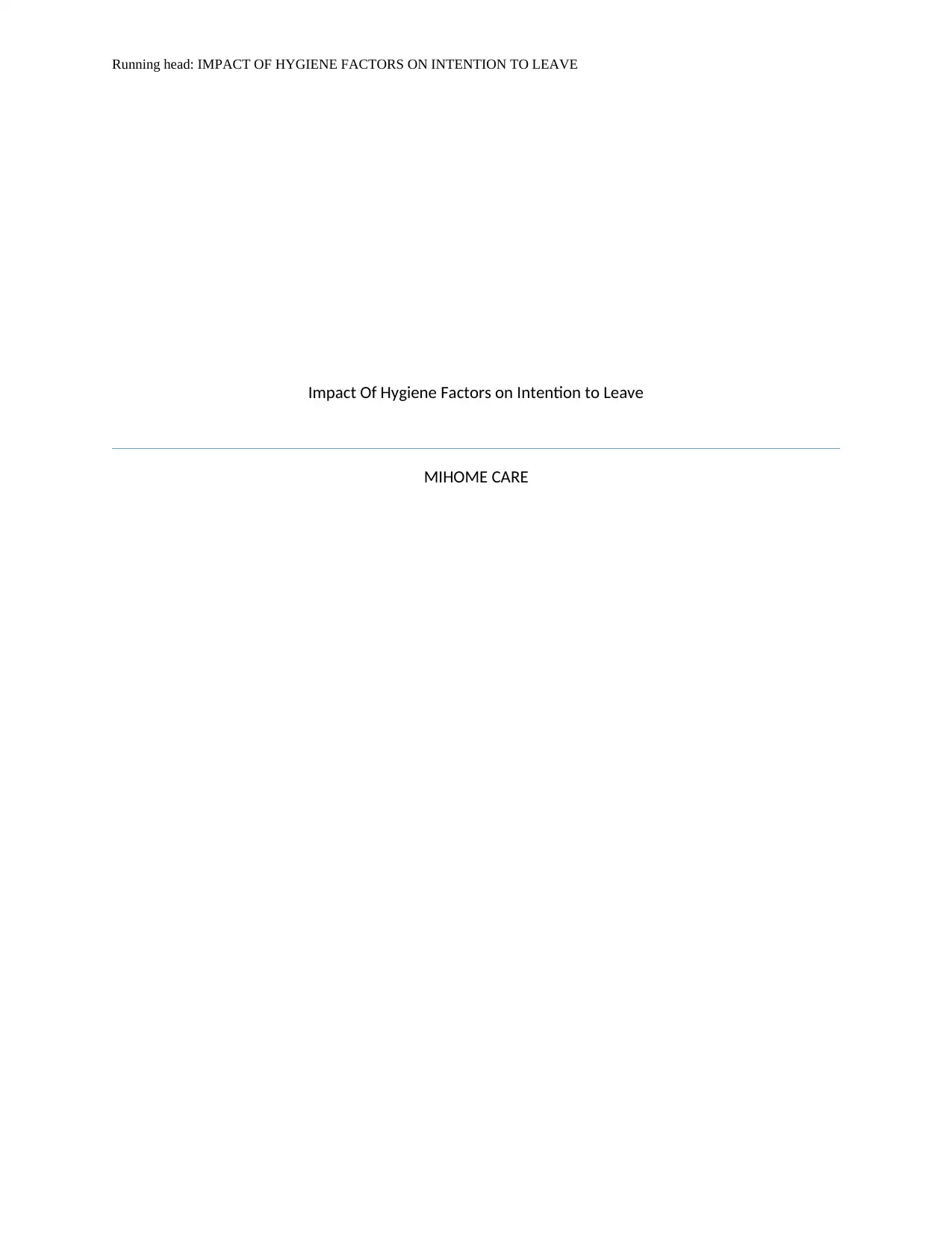
Running head: IMPACT OF HYGIENE FACTORS ON INTENTION TO LEAVE
Impact Of Hygiene Factors on Intention to Leave
MIHOME CARE
Impact Of Hygiene Factors on Intention to Leave
MIHOME CARE
Paraphrase This Document
Need a fresh take? Get an instant paraphrase of this document with our AI Paraphraser
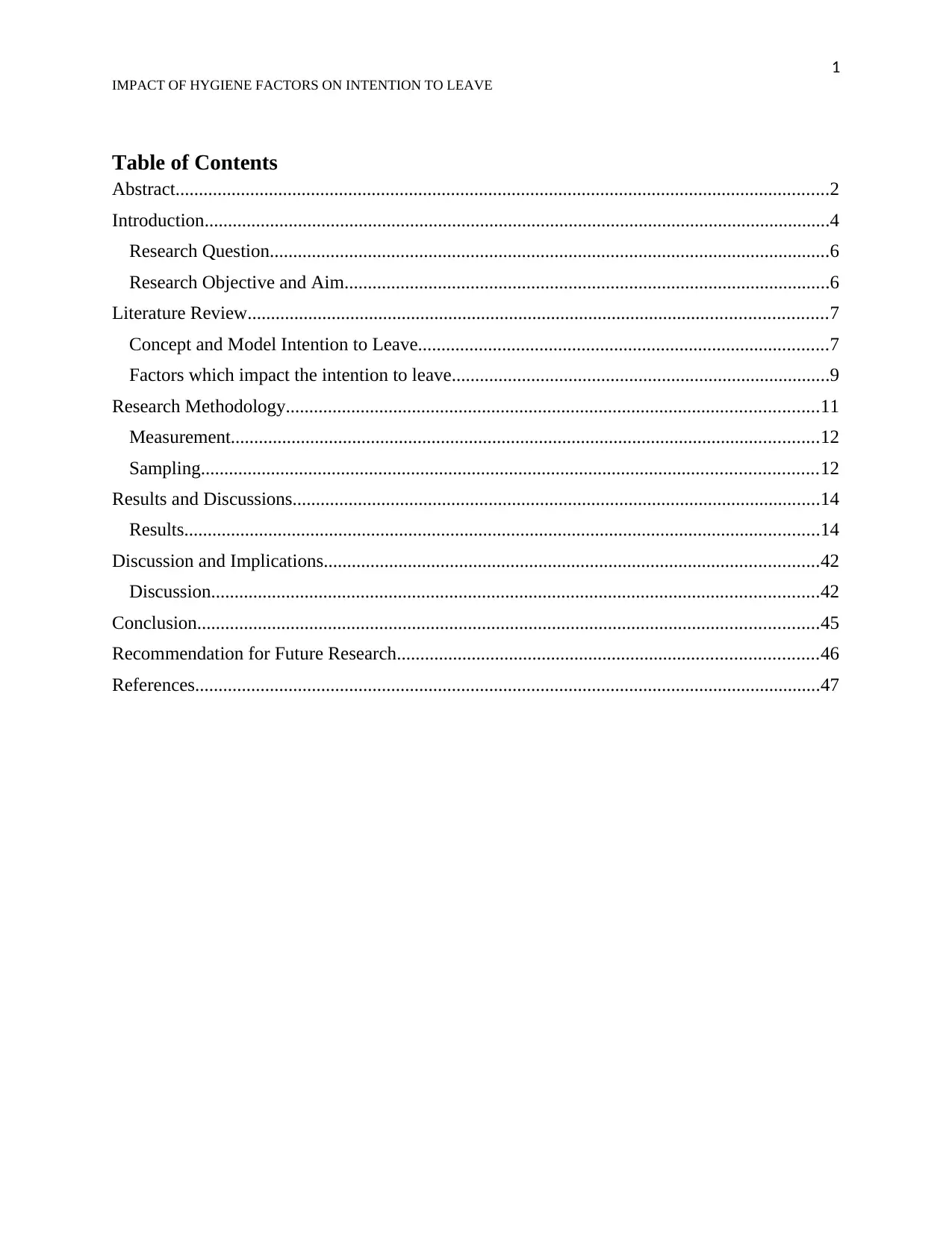
1
IMPACT OF HYGIENE FACTORS ON INTENTION TO LEAVE
Table of Contents
Abstract............................................................................................................................................2
Introduction......................................................................................................................................4
Research Question........................................................................................................................6
Research Objective and Aim........................................................................................................6
Literature Review............................................................................................................................7
Concept and Model Intention to Leave........................................................................................7
Factors which impact the intention to leave.................................................................................9
Research Methodology..................................................................................................................11
Measurement..............................................................................................................................12
Sampling....................................................................................................................................12
Results and Discussions.................................................................................................................14
Results........................................................................................................................................14
Discussion and Implications..........................................................................................................42
Discussion..................................................................................................................................42
Conclusion.....................................................................................................................................45
Recommendation for Future Research..........................................................................................46
References......................................................................................................................................47
IMPACT OF HYGIENE FACTORS ON INTENTION TO LEAVE
Table of Contents
Abstract............................................................................................................................................2
Introduction......................................................................................................................................4
Research Question........................................................................................................................6
Research Objective and Aim........................................................................................................6
Literature Review............................................................................................................................7
Concept and Model Intention to Leave........................................................................................7
Factors which impact the intention to leave.................................................................................9
Research Methodology..................................................................................................................11
Measurement..............................................................................................................................12
Sampling....................................................................................................................................12
Results and Discussions.................................................................................................................14
Results........................................................................................................................................14
Discussion and Implications..........................................................................................................42
Discussion..................................................................................................................................42
Conclusion.....................................................................................................................................45
Recommendation for Future Research..........................................................................................46
References......................................................................................................................................47
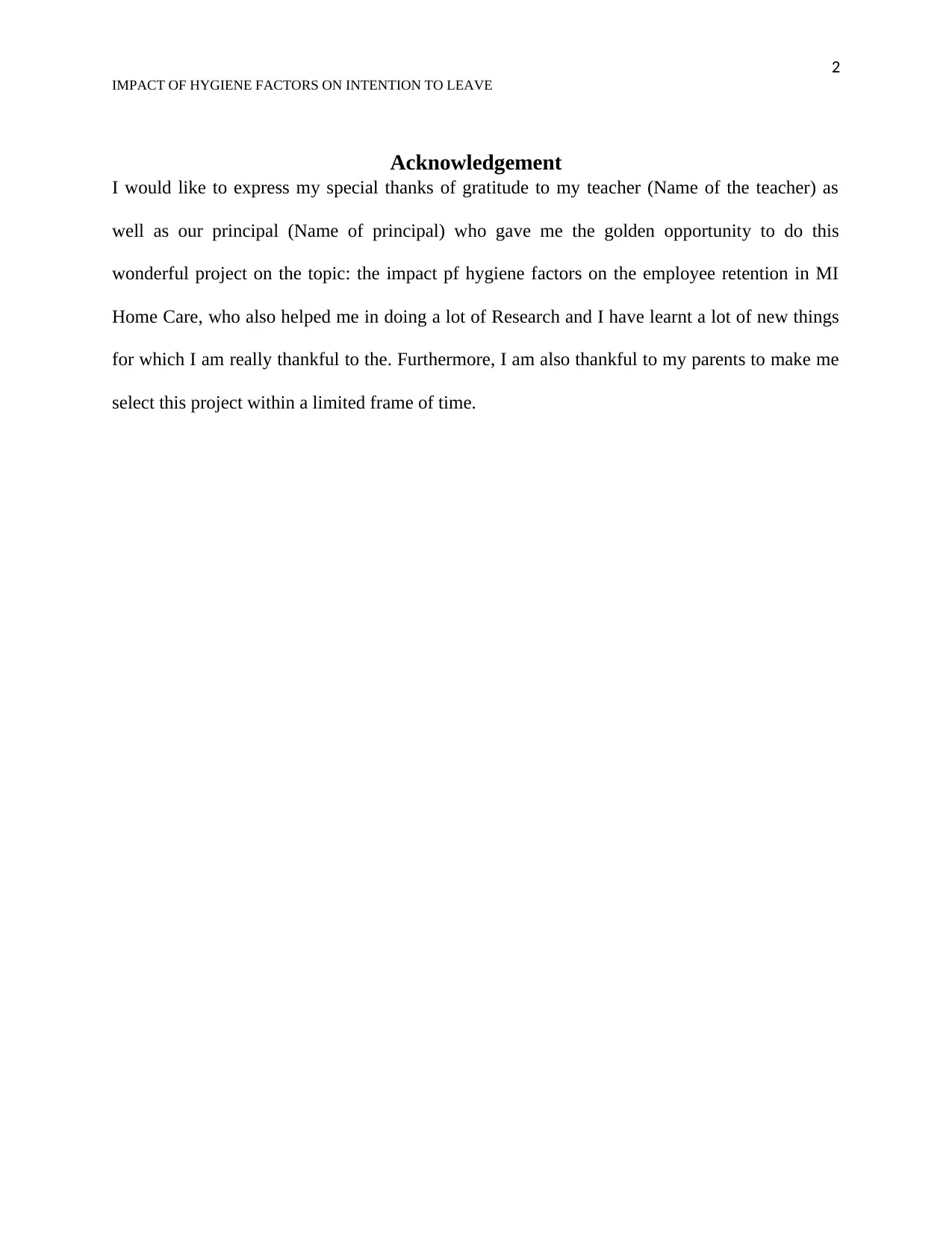
2
IMPACT OF HYGIENE FACTORS ON INTENTION TO LEAVE
Acknowledgement
I would like to express my special thanks of gratitude to my teacher (Name of the teacher) as
well as our principal (Name of principal) who gave me the golden opportunity to do this
wonderful project on the topic: the impact pf hygiene factors on the employee retention in MI
Home Care, who also helped me in doing a lot of Research and I have learnt a lot of new things
for which I am really thankful to the. Furthermore, I am also thankful to my parents to make me
select this project within a limited frame of time.
IMPACT OF HYGIENE FACTORS ON INTENTION TO LEAVE
Acknowledgement
I would like to express my special thanks of gratitude to my teacher (Name of the teacher) as
well as our principal (Name of principal) who gave me the golden opportunity to do this
wonderful project on the topic: the impact pf hygiene factors on the employee retention in MI
Home Care, who also helped me in doing a lot of Research and I have learnt a lot of new things
for which I am really thankful to the. Furthermore, I am also thankful to my parents to make me
select this project within a limited frame of time.
⊘ This is a preview!⊘
Do you want full access?
Subscribe today to unlock all pages.

Trusted by 1+ million students worldwide
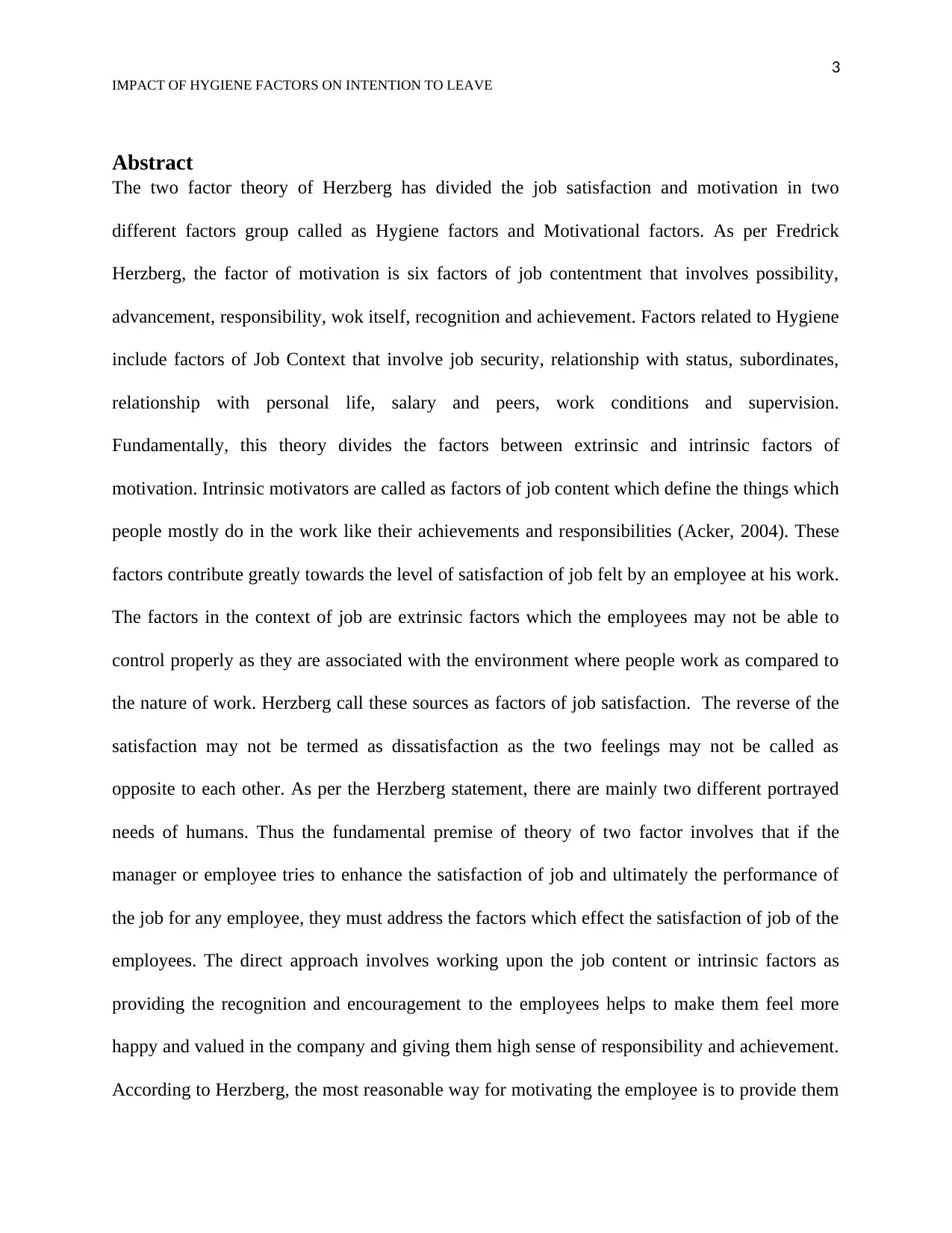
3
IMPACT OF HYGIENE FACTORS ON INTENTION TO LEAVE
Abstract
The two factor theory of Herzberg has divided the job satisfaction and motivation in two
different factors group called as Hygiene factors and Motivational factors. As per Fredrick
Herzberg, the factor of motivation is six factors of job contentment that involves possibility,
advancement, responsibility, wok itself, recognition and achievement. Factors related to Hygiene
include factors of Job Context that involve job security, relationship with status, subordinates,
relationship with personal life, salary and peers, work conditions and supervision.
Fundamentally, this theory divides the factors between extrinsic and intrinsic factors of
motivation. Intrinsic motivators are called as factors of job content which define the things which
people mostly do in the work like their achievements and responsibilities (Acker, 2004). These
factors contribute greatly towards the level of satisfaction of job felt by an employee at his work.
The factors in the context of job are extrinsic factors which the employees may not be able to
control properly as they are associated with the environment where people work as compared to
the nature of work. Herzberg call these sources as factors of job satisfaction. The reverse of the
satisfaction may not be termed as dissatisfaction as the two feelings may not be called as
opposite to each other. As per the Herzberg statement, there are mainly two different portrayed
needs of humans. Thus the fundamental premise of theory of two factor involves that if the
manager or employee tries to enhance the satisfaction of job and ultimately the performance of
the job for any employee, they must address the factors which effect the satisfaction of job of the
employees. The direct approach involves working upon the job content or intrinsic factors as
providing the recognition and encouragement to the employees helps to make them feel more
happy and valued in the company and giving them high sense of responsibility and achievement.
According to Herzberg, the most reasonable way for motivating the employee is to provide them
IMPACT OF HYGIENE FACTORS ON INTENTION TO LEAVE
Abstract
The two factor theory of Herzberg has divided the job satisfaction and motivation in two
different factors group called as Hygiene factors and Motivational factors. As per Fredrick
Herzberg, the factor of motivation is six factors of job contentment that involves possibility,
advancement, responsibility, wok itself, recognition and achievement. Factors related to Hygiene
include factors of Job Context that involve job security, relationship with status, subordinates,
relationship with personal life, salary and peers, work conditions and supervision.
Fundamentally, this theory divides the factors between extrinsic and intrinsic factors of
motivation. Intrinsic motivators are called as factors of job content which define the things which
people mostly do in the work like their achievements and responsibilities (Acker, 2004). These
factors contribute greatly towards the level of satisfaction of job felt by an employee at his work.
The factors in the context of job are extrinsic factors which the employees may not be able to
control properly as they are associated with the environment where people work as compared to
the nature of work. Herzberg call these sources as factors of job satisfaction. The reverse of the
satisfaction may not be termed as dissatisfaction as the two feelings may not be called as
opposite to each other. As per the Herzberg statement, there are mainly two different portrayed
needs of humans. Thus the fundamental premise of theory of two factor involves that if the
manager or employee tries to enhance the satisfaction of job and ultimately the performance of
the job for any employee, they must address the factors which effect the satisfaction of job of the
employees. The direct approach involves working upon the job content or intrinsic factors as
providing the recognition and encouragement to the employees helps to make them feel more
happy and valued in the company and giving them high sense of responsibility and achievement.
According to Herzberg, the most reasonable way for motivating the employee is to provide them
Paraphrase This Document
Need a fresh take? Get an instant paraphrase of this document with our AI Paraphraser
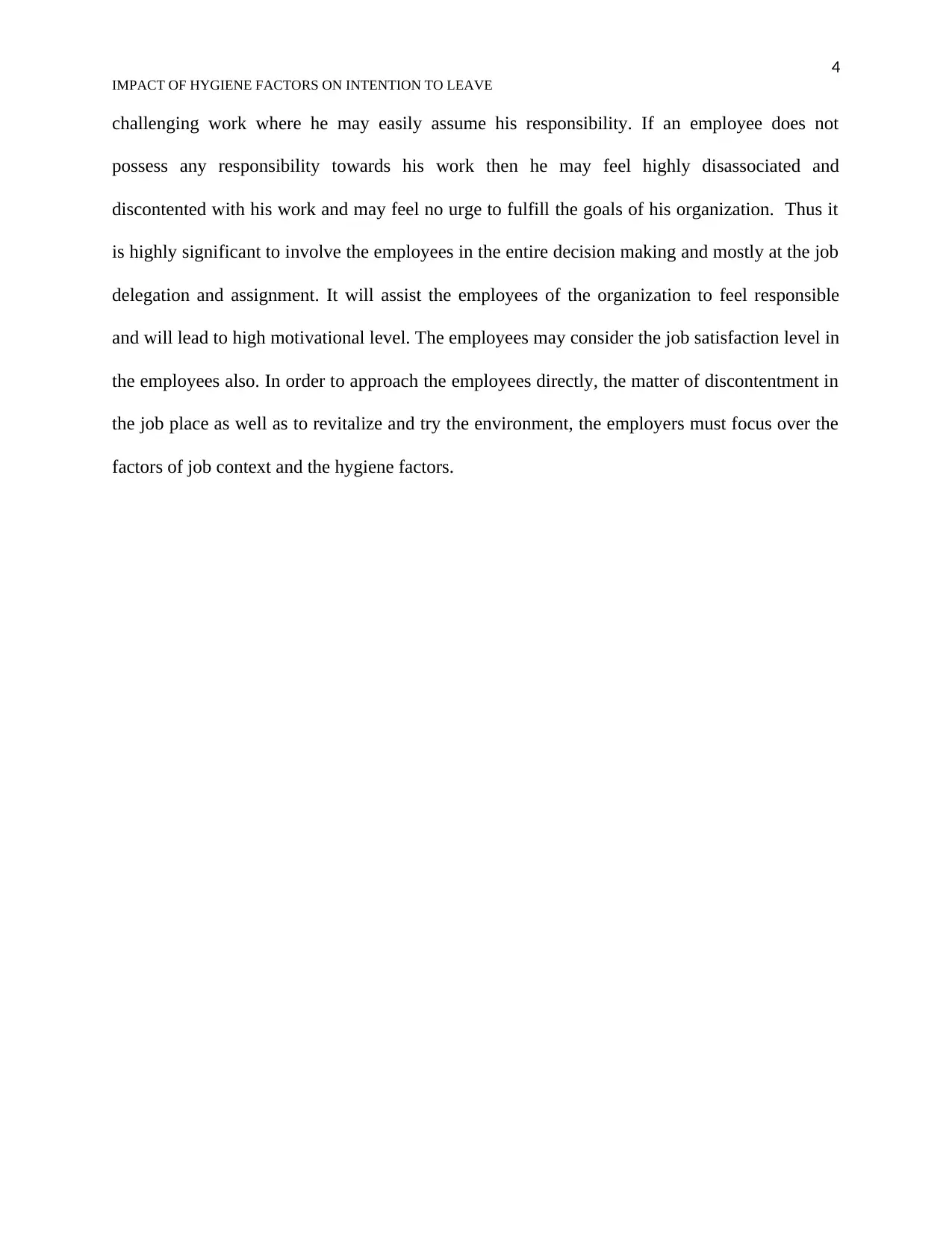
4
IMPACT OF HYGIENE FACTORS ON INTENTION TO LEAVE
challenging work where he may easily assume his responsibility. If an employee does not
possess any responsibility towards his work then he may feel highly disassociated and
discontented with his work and may feel no urge to fulfill the goals of his organization. Thus it
is highly significant to involve the employees in the entire decision making and mostly at the job
delegation and assignment. It will assist the employees of the organization to feel responsible
and will lead to high motivational level. The employees may consider the job satisfaction level in
the employees also. In order to approach the employees directly, the matter of discontentment in
the job place as well as to revitalize and try the environment, the employers must focus over the
factors of job context and the hygiene factors.
IMPACT OF HYGIENE FACTORS ON INTENTION TO LEAVE
challenging work where he may easily assume his responsibility. If an employee does not
possess any responsibility towards his work then he may feel highly disassociated and
discontented with his work and may feel no urge to fulfill the goals of his organization. Thus it
is highly significant to involve the employees in the entire decision making and mostly at the job
delegation and assignment. It will assist the employees of the organization to feel responsible
and will lead to high motivational level. The employees may consider the job satisfaction level in
the employees also. In order to approach the employees directly, the matter of discontentment in
the job place as well as to revitalize and try the environment, the employers must focus over the
factors of job context and the hygiene factors.
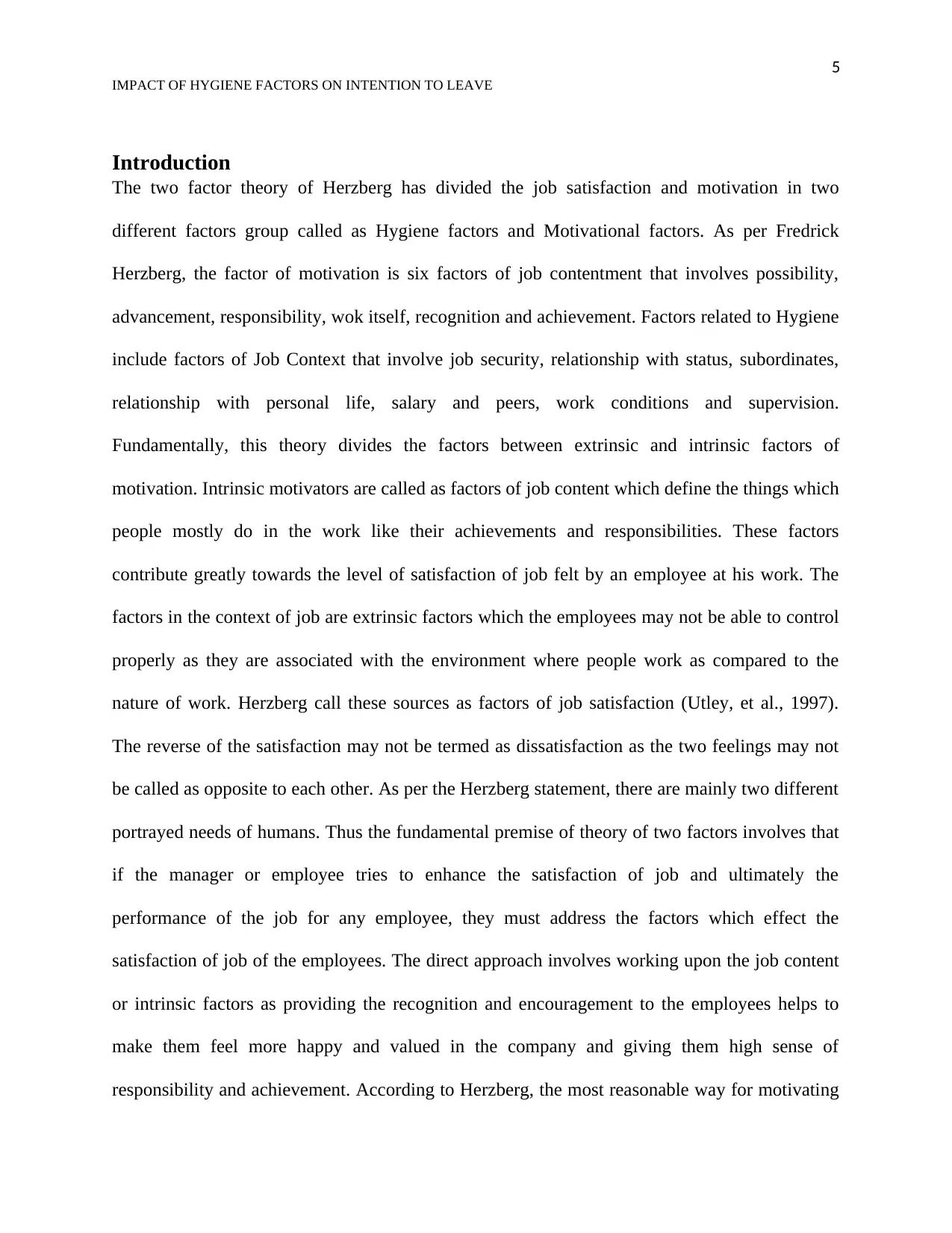
5
IMPACT OF HYGIENE FACTORS ON INTENTION TO LEAVE
Introduction
The two factor theory of Herzberg has divided the job satisfaction and motivation in two
different factors group called as Hygiene factors and Motivational factors. As per Fredrick
Herzberg, the factor of motivation is six factors of job contentment that involves possibility,
advancement, responsibility, wok itself, recognition and achievement. Factors related to Hygiene
include factors of Job Context that involve job security, relationship with status, subordinates,
relationship with personal life, salary and peers, work conditions and supervision.
Fundamentally, this theory divides the factors between extrinsic and intrinsic factors of
motivation. Intrinsic motivators are called as factors of job content which define the things which
people mostly do in the work like their achievements and responsibilities. These factors
contribute greatly towards the level of satisfaction of job felt by an employee at his work. The
factors in the context of job are extrinsic factors which the employees may not be able to control
properly as they are associated with the environment where people work as compared to the
nature of work. Herzberg call these sources as factors of job satisfaction (Utley, et al., 1997).
The reverse of the satisfaction may not be termed as dissatisfaction as the two feelings may not
be called as opposite to each other. As per the Herzberg statement, there are mainly two different
portrayed needs of humans. Thus the fundamental premise of theory of two factors involves that
if the manager or employee tries to enhance the satisfaction of job and ultimately the
performance of the job for any employee, they must address the factors which effect the
satisfaction of job of the employees. The direct approach involves working upon the job content
or intrinsic factors as providing the recognition and encouragement to the employees helps to
make them feel more happy and valued in the company and giving them high sense of
responsibility and achievement. According to Herzberg, the most reasonable way for motivating
IMPACT OF HYGIENE FACTORS ON INTENTION TO LEAVE
Introduction
The two factor theory of Herzberg has divided the job satisfaction and motivation in two
different factors group called as Hygiene factors and Motivational factors. As per Fredrick
Herzberg, the factor of motivation is six factors of job contentment that involves possibility,
advancement, responsibility, wok itself, recognition and achievement. Factors related to Hygiene
include factors of Job Context that involve job security, relationship with status, subordinates,
relationship with personal life, salary and peers, work conditions and supervision.
Fundamentally, this theory divides the factors between extrinsic and intrinsic factors of
motivation. Intrinsic motivators are called as factors of job content which define the things which
people mostly do in the work like their achievements and responsibilities. These factors
contribute greatly towards the level of satisfaction of job felt by an employee at his work. The
factors in the context of job are extrinsic factors which the employees may not be able to control
properly as they are associated with the environment where people work as compared to the
nature of work. Herzberg call these sources as factors of job satisfaction (Utley, et al., 1997).
The reverse of the satisfaction may not be termed as dissatisfaction as the two feelings may not
be called as opposite to each other. As per the Herzberg statement, there are mainly two different
portrayed needs of humans. Thus the fundamental premise of theory of two factors involves that
if the manager or employee tries to enhance the satisfaction of job and ultimately the
performance of the job for any employee, they must address the factors which effect the
satisfaction of job of the employees. The direct approach involves working upon the job content
or intrinsic factors as providing the recognition and encouragement to the employees helps to
make them feel more happy and valued in the company and giving them high sense of
responsibility and achievement. According to Herzberg, the most reasonable way for motivating
⊘ This is a preview!⊘
Do you want full access?
Subscribe today to unlock all pages.

Trusted by 1+ million students worldwide
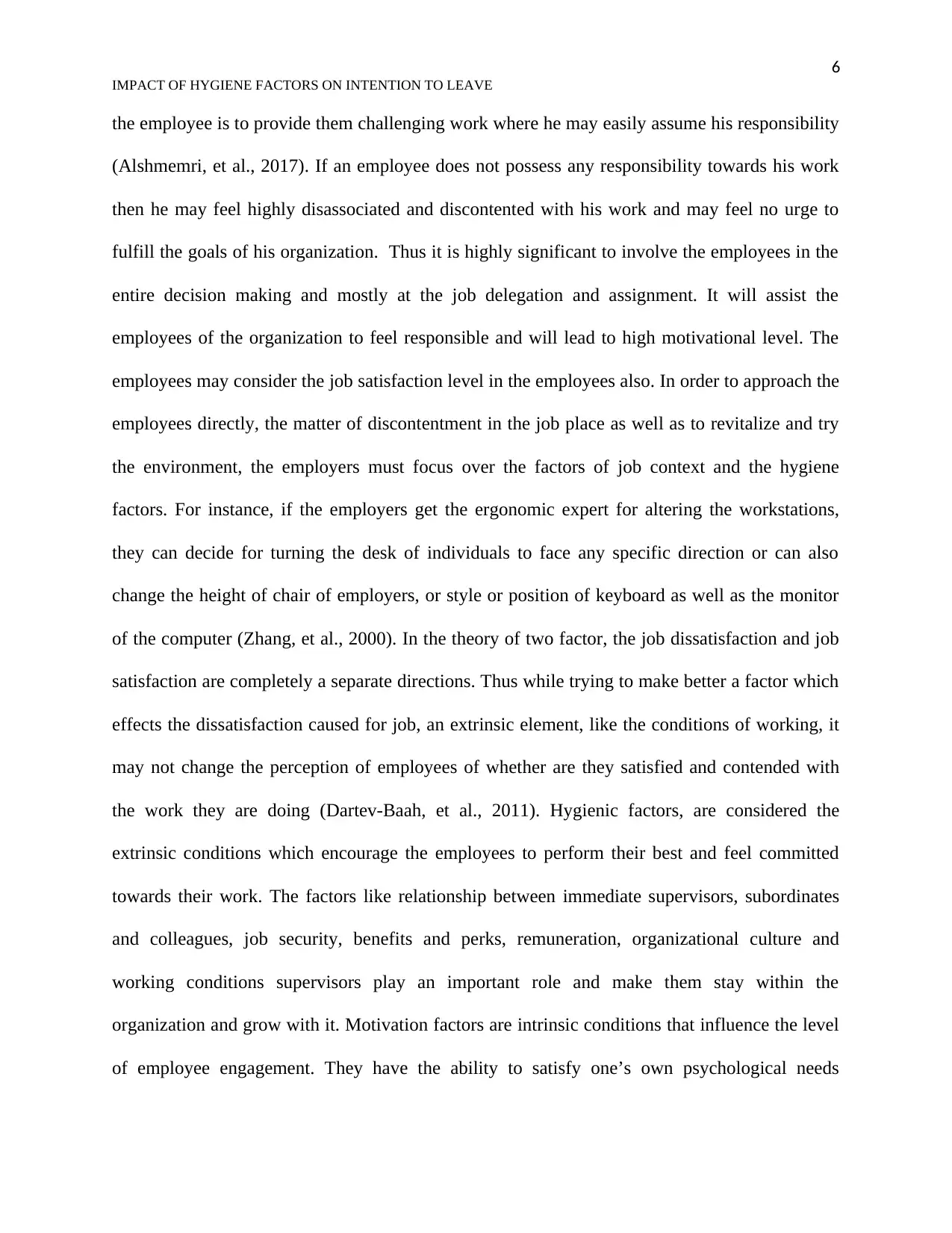
6
IMPACT OF HYGIENE FACTORS ON INTENTION TO LEAVE
the employee is to provide them challenging work where he may easily assume his responsibility
(Alshmemri, et al., 2017). If an employee does not possess any responsibility towards his work
then he may feel highly disassociated and discontented with his work and may feel no urge to
fulfill the goals of his organization. Thus it is highly significant to involve the employees in the
entire decision making and mostly at the job delegation and assignment. It will assist the
employees of the organization to feel responsible and will lead to high motivational level. The
employees may consider the job satisfaction level in the employees also. In order to approach the
employees directly, the matter of discontentment in the job place as well as to revitalize and try
the environment, the employers must focus over the factors of job context and the hygiene
factors. For instance, if the employers get the ergonomic expert for altering the workstations,
they can decide for turning the desk of individuals to face any specific direction or can also
change the height of chair of employers, or style or position of keyboard as well as the monitor
of the computer (Zhang, et al., 2000). In the theory of two factor, the job dissatisfaction and job
satisfaction are completely a separate directions. Thus while trying to make better a factor which
effects the dissatisfaction caused for job, an extrinsic element, like the conditions of working, it
may not change the perception of employees of whether are they satisfied and contended with
the work they are doing (Dartev-Baah, et al., 2011). Hygienic factors, are considered the
extrinsic conditions which encourage the employees to perform their best and feel committed
towards their work. The factors like relationship between immediate supervisors, subordinates
and colleagues, job security, benefits and perks, remuneration, organizational culture and
working conditions supervisors play an important role and make them stay within the
organization and grow with it. Motivation factors are intrinsic conditions that influence the level
of employee engagement. They have the ability to satisfy one’s own psychological needs
IMPACT OF HYGIENE FACTORS ON INTENTION TO LEAVE
the employee is to provide them challenging work where he may easily assume his responsibility
(Alshmemri, et al., 2017). If an employee does not possess any responsibility towards his work
then he may feel highly disassociated and discontented with his work and may feel no urge to
fulfill the goals of his organization. Thus it is highly significant to involve the employees in the
entire decision making and mostly at the job delegation and assignment. It will assist the
employees of the organization to feel responsible and will lead to high motivational level. The
employees may consider the job satisfaction level in the employees also. In order to approach the
employees directly, the matter of discontentment in the job place as well as to revitalize and try
the environment, the employers must focus over the factors of job context and the hygiene
factors. For instance, if the employers get the ergonomic expert for altering the workstations,
they can decide for turning the desk of individuals to face any specific direction or can also
change the height of chair of employers, or style or position of keyboard as well as the monitor
of the computer (Zhang, et al., 2000). In the theory of two factor, the job dissatisfaction and job
satisfaction are completely a separate directions. Thus while trying to make better a factor which
effects the dissatisfaction caused for job, an extrinsic element, like the conditions of working, it
may not change the perception of employees of whether are they satisfied and contended with
the work they are doing (Dartev-Baah, et al., 2011). Hygienic factors, are considered the
extrinsic conditions which encourage the employees to perform their best and feel committed
towards their work. The factors like relationship between immediate supervisors, subordinates
and colleagues, job security, benefits and perks, remuneration, organizational culture and
working conditions supervisors play an important role and make them stay within the
organization and grow with it. Motivation factors are intrinsic conditions that influence the level
of employee engagement. They have the ability to satisfy one’s own psychological needs
Paraphrase This Document
Need a fresh take? Get an instant paraphrase of this document with our AI Paraphraser
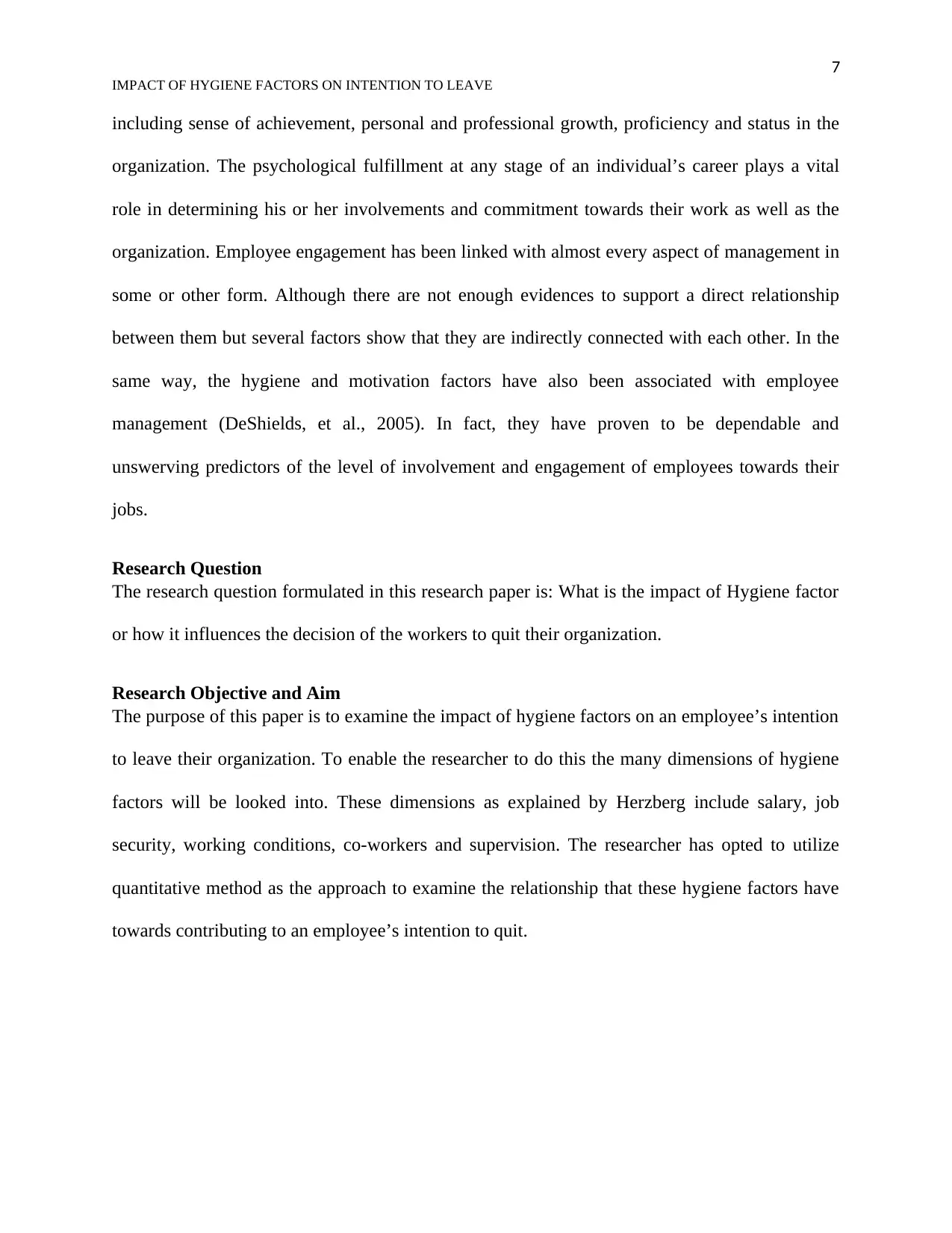
7
IMPACT OF HYGIENE FACTORS ON INTENTION TO LEAVE
including sense of achievement, personal and professional growth, proficiency and status in the
organization. The psychological fulfillment at any stage of an individual’s career plays a vital
role in determining his or her involvements and commitment towards their work as well as the
organization. Employee engagement has been linked with almost every aspect of management in
some or other form. Although there are not enough evidences to support a direct relationship
between them but several factors show that they are indirectly connected with each other. In the
same way, the hygiene and motivation factors have also been associated with employee
management (DeShields, et al., 2005). In fact, they have proven to be dependable and
unswerving predictors of the level of involvement and engagement of employees towards their
jobs.
Research Question
The research question formulated in this research paper is: What is the impact of Hygiene factor
or how it influences the decision of the workers to quit their organization.
Research Objective and Aim
The purpose of this paper is to examine the impact of hygiene factors on an employee’s intention
to leave their organization. To enable the researcher to do this the many dimensions of hygiene
factors will be looked into. These dimensions as explained by Herzberg include salary, job
security, working conditions, co-workers and supervision. The researcher has opted to utilize
quantitative method as the approach to examine the relationship that these hygiene factors have
towards contributing to an employee’s intention to quit.
IMPACT OF HYGIENE FACTORS ON INTENTION TO LEAVE
including sense of achievement, personal and professional growth, proficiency and status in the
organization. The psychological fulfillment at any stage of an individual’s career plays a vital
role in determining his or her involvements and commitment towards their work as well as the
organization. Employee engagement has been linked with almost every aspect of management in
some or other form. Although there are not enough evidences to support a direct relationship
between them but several factors show that they are indirectly connected with each other. In the
same way, the hygiene and motivation factors have also been associated with employee
management (DeShields, et al., 2005). In fact, they have proven to be dependable and
unswerving predictors of the level of involvement and engagement of employees towards their
jobs.
Research Question
The research question formulated in this research paper is: What is the impact of Hygiene factor
or how it influences the decision of the workers to quit their organization.
Research Objective and Aim
The purpose of this paper is to examine the impact of hygiene factors on an employee’s intention
to leave their organization. To enable the researcher to do this the many dimensions of hygiene
factors will be looked into. These dimensions as explained by Herzberg include salary, job
security, working conditions, co-workers and supervision. The researcher has opted to utilize
quantitative method as the approach to examine the relationship that these hygiene factors have
towards contributing to an employee’s intention to quit.
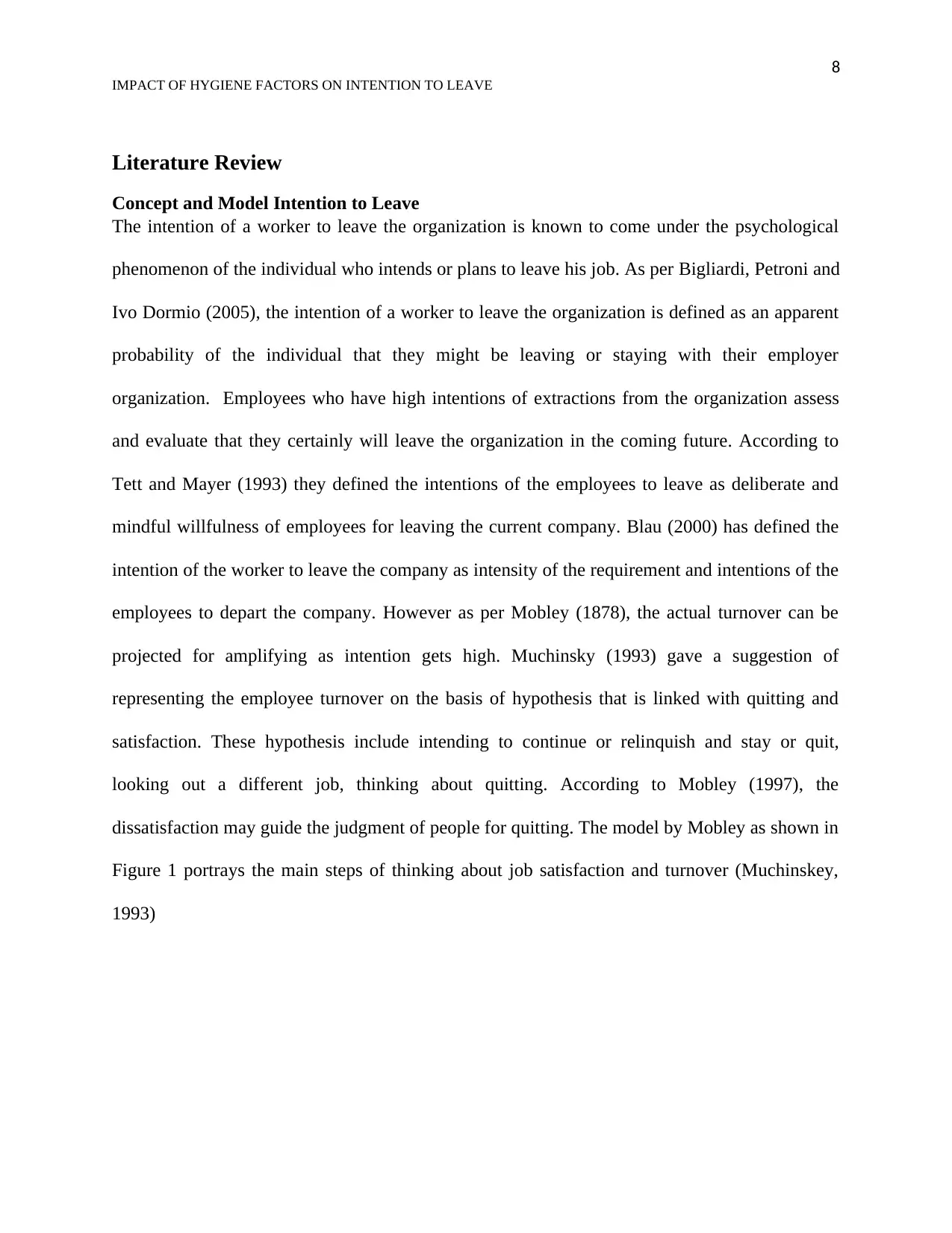
8
IMPACT OF HYGIENE FACTORS ON INTENTION TO LEAVE
Literature Review
Concept and Model Intention to Leave
The intention of a worker to leave the organization is known to come under the psychological
phenomenon of the individual who intends or plans to leave his job. As per Bigliardi, Petroni and
Ivo Dormio (2005), the intention of a worker to leave the organization is defined as an apparent
probability of the individual that they might be leaving or staying with their employer
organization. Employees who have high intentions of extractions from the organization assess
and evaluate that they certainly will leave the organization in the coming future. According to
Tett and Mayer (1993) they defined the intentions of the employees to leave as deliberate and
mindful willfulness of employees for leaving the current company. Blau (2000) has defined the
intention of the worker to leave the company as intensity of the requirement and intentions of the
employees to depart the company. However as per Mobley (1878), the actual turnover can be
projected for amplifying as intention gets high. Muchinsky (1993) gave a suggestion of
representing the employee turnover on the basis of hypothesis that is linked with quitting and
satisfaction. These hypothesis include intending to continue or relinquish and stay or quit,
looking out a different job, thinking about quitting. According to Mobley (1997), the
dissatisfaction may guide the judgment of people for quitting. The model by Mobley as shown in
Figure 1 portrays the main steps of thinking about job satisfaction and turnover (Muchinskey,
1993)
IMPACT OF HYGIENE FACTORS ON INTENTION TO LEAVE
Literature Review
Concept and Model Intention to Leave
The intention of a worker to leave the organization is known to come under the psychological
phenomenon of the individual who intends or plans to leave his job. As per Bigliardi, Petroni and
Ivo Dormio (2005), the intention of a worker to leave the organization is defined as an apparent
probability of the individual that they might be leaving or staying with their employer
organization. Employees who have high intentions of extractions from the organization assess
and evaluate that they certainly will leave the organization in the coming future. According to
Tett and Mayer (1993) they defined the intentions of the employees to leave as deliberate and
mindful willfulness of employees for leaving the current company. Blau (2000) has defined the
intention of the worker to leave the company as intensity of the requirement and intentions of the
employees to depart the company. However as per Mobley (1878), the actual turnover can be
projected for amplifying as intention gets high. Muchinsky (1993) gave a suggestion of
representing the employee turnover on the basis of hypothesis that is linked with quitting and
satisfaction. These hypothesis include intending to continue or relinquish and stay or quit,
looking out a different job, thinking about quitting. According to Mobley (1997), the
dissatisfaction may guide the judgment of people for quitting. The model by Mobley as shown in
Figure 1 portrays the main steps of thinking about job satisfaction and turnover (Muchinskey,
1993)
⊘ This is a preview!⊘
Do you want full access?
Subscribe today to unlock all pages.

Trusted by 1+ million students worldwide
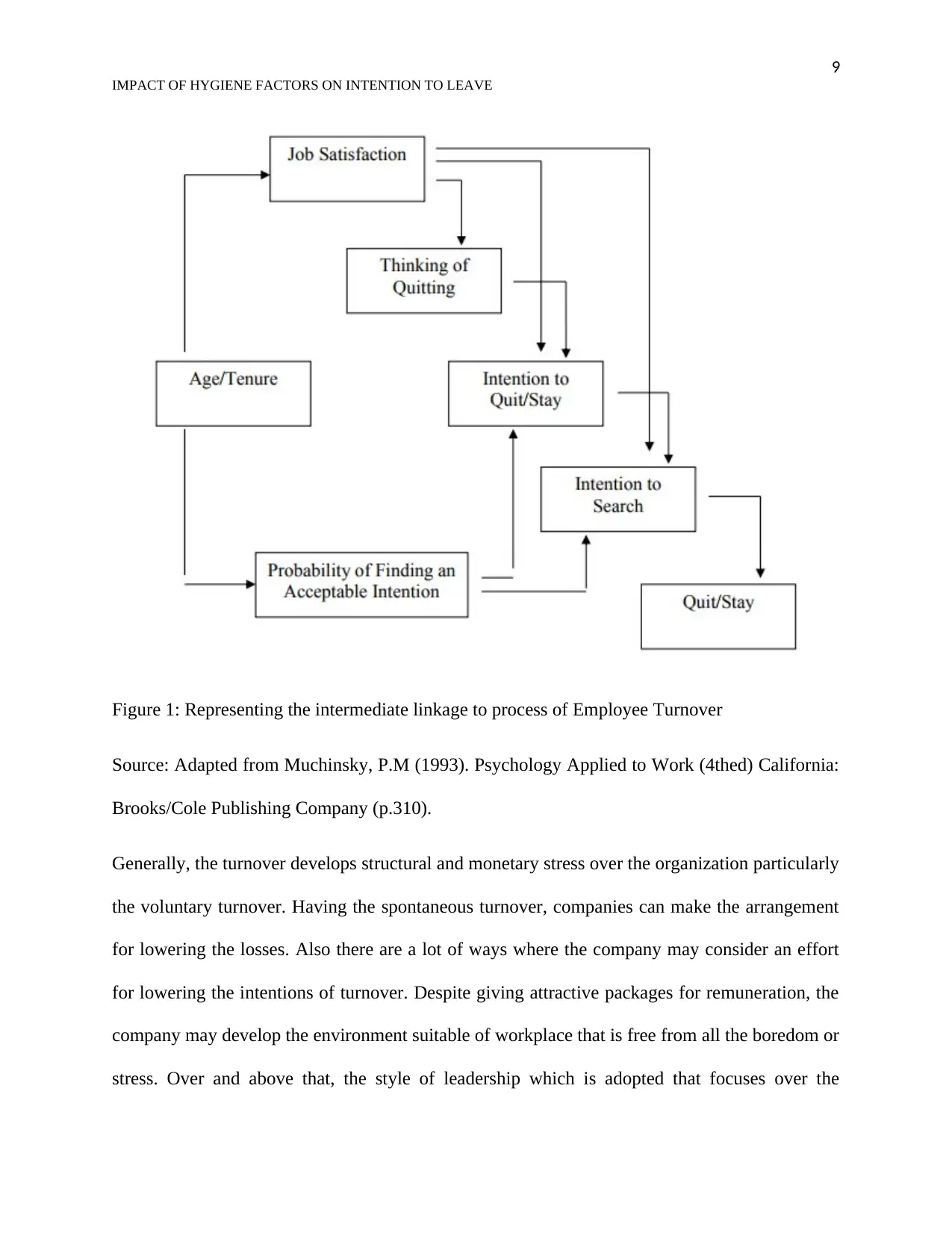
9
IMPACT OF HYGIENE FACTORS ON INTENTION TO LEAVE
Figure 1: Representing the intermediate linkage to process of Employee Turnover
Source: Adapted from Muchinsky, P.M (1993). Psychology Applied to Work (4thed) California:
Brooks/Cole Publishing Company (p.310).
Generally, the turnover develops structural and monetary stress over the organization particularly
the voluntary turnover. Having the spontaneous turnover, companies can make the arrangement
for lowering the losses. Also there are a lot of ways where the company may consider an effort
for lowering the intentions of turnover. Despite giving attractive packages for remuneration, the
company may develop the environment suitable of workplace that is free from all the boredom or
stress. Over and above that, the style of leadership which is adopted that focuses over the
IMPACT OF HYGIENE FACTORS ON INTENTION TO LEAVE
Figure 1: Representing the intermediate linkage to process of Employee Turnover
Source: Adapted from Muchinsky, P.M (1993). Psychology Applied to Work (4thed) California:
Brooks/Cole Publishing Company (p.310).
Generally, the turnover develops structural and monetary stress over the organization particularly
the voluntary turnover. Having the spontaneous turnover, companies can make the arrangement
for lowering the losses. Also there are a lot of ways where the company may consider an effort
for lowering the intentions of turnover. Despite giving attractive packages for remuneration, the
company may develop the environment suitable of workplace that is free from all the boredom or
stress. Over and above that, the style of leadership which is adopted that focuses over the
Paraphrase This Document
Need a fresh take? Get an instant paraphrase of this document with our AI Paraphraser
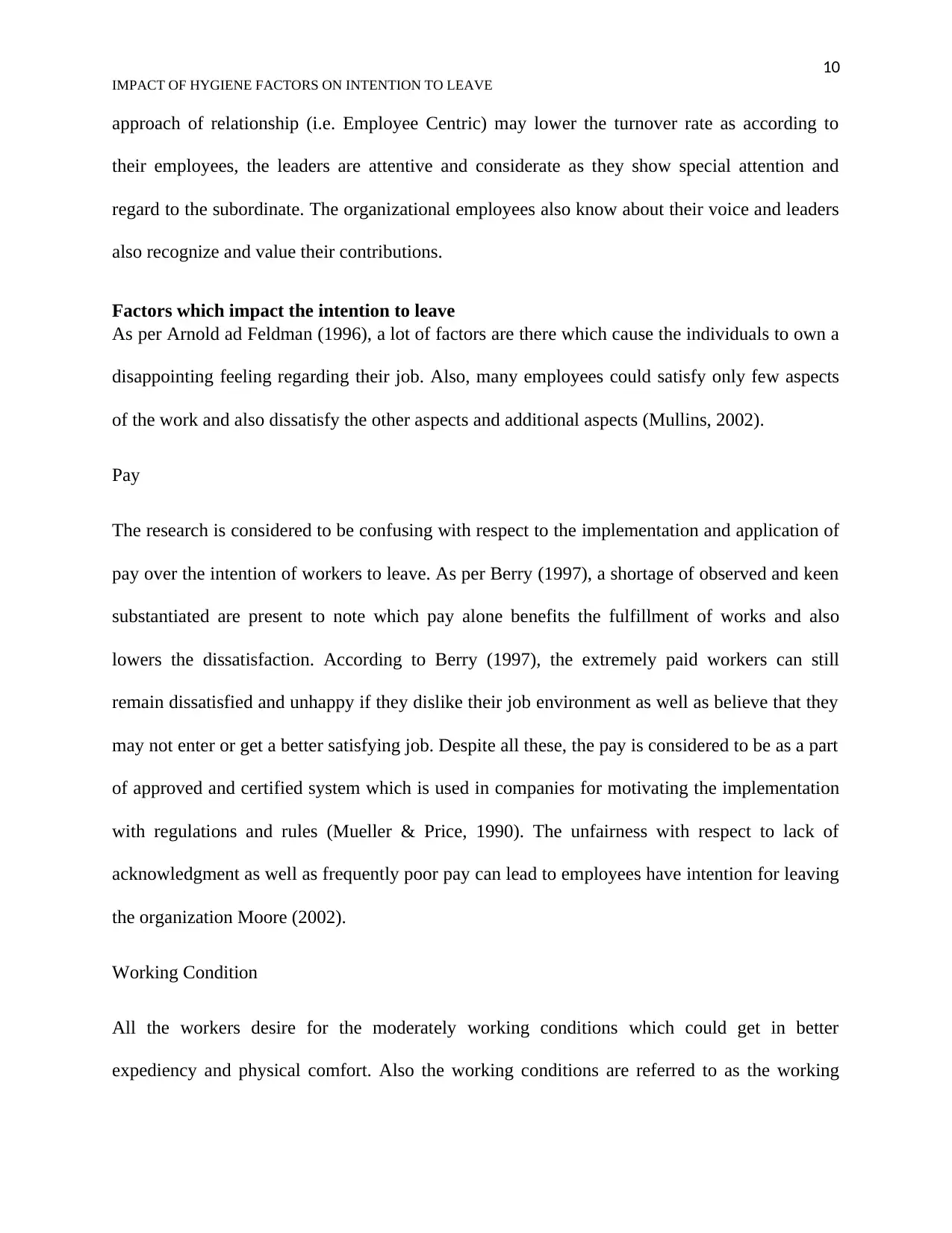
10
IMPACT OF HYGIENE FACTORS ON INTENTION TO LEAVE
approach of relationship (i.e. Employee Centric) may lower the turnover rate as according to
their employees, the leaders are attentive and considerate as they show special attention and
regard to the subordinate. The organizational employees also know about their voice and leaders
also recognize and value their contributions.
Factors which impact the intention to leave
As per Arnold ad Feldman (1996), a lot of factors are there which cause the individuals to own a
disappointing feeling regarding their job. Also, many employees could satisfy only few aspects
of the work and also dissatisfy the other aspects and additional aspects (Mullins, 2002).
Pay
The research is considered to be confusing with respect to the implementation and application of
pay over the intention of workers to leave. As per Berry (1997), a shortage of observed and keen
substantiated are present to note which pay alone benefits the fulfillment of works and also
lowers the dissatisfaction. According to Berry (1997), the extremely paid workers can still
remain dissatisfied and unhappy if they dislike their job environment as well as believe that they
may not enter or get a better satisfying job. Despite all these, the pay is considered to be as a part
of approved and certified system which is used in companies for motivating the implementation
with regulations and rules (Mueller & Price, 1990). The unfairness with respect to lack of
acknowledgment as well as frequently poor pay can lead to employees have intention for leaving
the organization Moore (2002).
Working Condition
All the workers desire for the moderately working conditions which could get in better
expediency and physical comfort. Also the working conditions are referred to as the working
IMPACT OF HYGIENE FACTORS ON INTENTION TO LEAVE
approach of relationship (i.e. Employee Centric) may lower the turnover rate as according to
their employees, the leaders are attentive and considerate as they show special attention and
regard to the subordinate. The organizational employees also know about their voice and leaders
also recognize and value their contributions.
Factors which impact the intention to leave
As per Arnold ad Feldman (1996), a lot of factors are there which cause the individuals to own a
disappointing feeling regarding their job. Also, many employees could satisfy only few aspects
of the work and also dissatisfy the other aspects and additional aspects (Mullins, 2002).
Pay
The research is considered to be confusing with respect to the implementation and application of
pay over the intention of workers to leave. As per Berry (1997), a shortage of observed and keen
substantiated are present to note which pay alone benefits the fulfillment of works and also
lowers the dissatisfaction. According to Berry (1997), the extremely paid workers can still
remain dissatisfied and unhappy if they dislike their job environment as well as believe that they
may not enter or get a better satisfying job. Despite all these, the pay is considered to be as a part
of approved and certified system which is used in companies for motivating the implementation
with regulations and rules (Mueller & Price, 1990). The unfairness with respect to lack of
acknowledgment as well as frequently poor pay can lead to employees have intention for leaving
the organization Moore (2002).
Working Condition
All the workers desire for the moderately working conditions which could get in better
expediency and physical comfort. Also the working conditions are referred to as the working
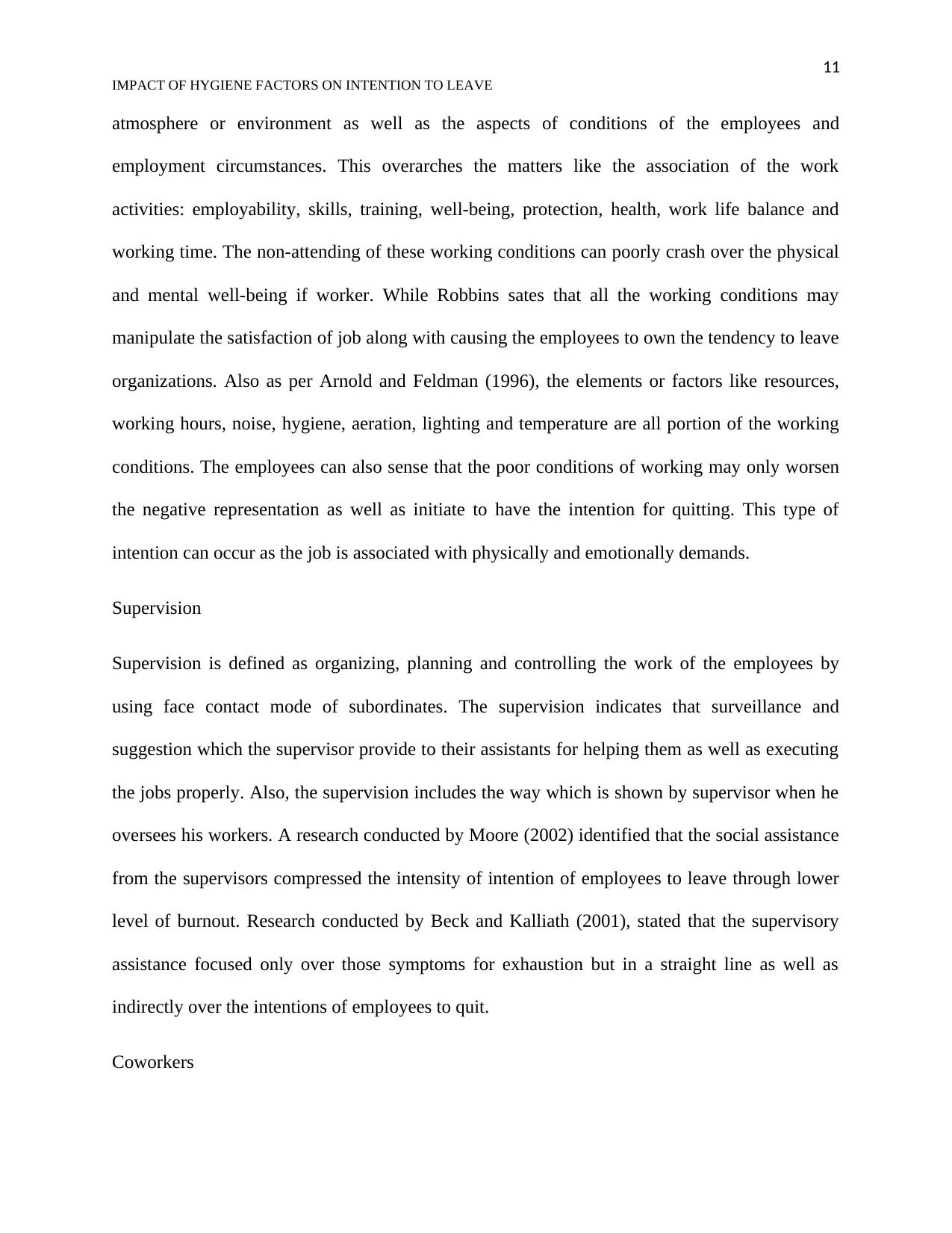
11
IMPACT OF HYGIENE FACTORS ON INTENTION TO LEAVE
atmosphere or environment as well as the aspects of conditions of the employees and
employment circumstances. This overarches the matters like the association of the work
activities: employability, skills, training, well-being, protection, health, work life balance and
working time. The non-attending of these working conditions can poorly crash over the physical
and mental well-being if worker. While Robbins sates that all the working conditions may
manipulate the satisfaction of job along with causing the employees to own the tendency to leave
organizations. Also as per Arnold and Feldman (1996), the elements or factors like resources,
working hours, noise, hygiene, aeration, lighting and temperature are all portion of the working
conditions. The employees can also sense that the poor conditions of working may only worsen
the negative representation as well as initiate to have the intention for quitting. This type of
intention can occur as the job is associated with physically and emotionally demands.
Supervision
Supervision is defined as organizing, planning and controlling the work of the employees by
using face contact mode of subordinates. The supervision indicates that surveillance and
suggestion which the supervisor provide to their assistants for helping them as well as executing
the jobs properly. Also, the supervision includes the way which is shown by supervisor when he
oversees his workers. A research conducted by Moore (2002) identified that the social assistance
from the supervisors compressed the intensity of intention of employees to leave through lower
level of burnout. Research conducted by Beck and Kalliath (2001), stated that the supervisory
assistance focused only over those symptoms for exhaustion but in a straight line as well as
indirectly over the intentions of employees to quit.
Coworkers
IMPACT OF HYGIENE FACTORS ON INTENTION TO LEAVE
atmosphere or environment as well as the aspects of conditions of the employees and
employment circumstances. This overarches the matters like the association of the work
activities: employability, skills, training, well-being, protection, health, work life balance and
working time. The non-attending of these working conditions can poorly crash over the physical
and mental well-being if worker. While Robbins sates that all the working conditions may
manipulate the satisfaction of job along with causing the employees to own the tendency to leave
organizations. Also as per Arnold and Feldman (1996), the elements or factors like resources,
working hours, noise, hygiene, aeration, lighting and temperature are all portion of the working
conditions. The employees can also sense that the poor conditions of working may only worsen
the negative representation as well as initiate to have the intention for quitting. This type of
intention can occur as the job is associated with physically and emotionally demands.
Supervision
Supervision is defined as organizing, planning and controlling the work of the employees by
using face contact mode of subordinates. The supervision indicates that surveillance and
suggestion which the supervisor provide to their assistants for helping them as well as executing
the jobs properly. Also, the supervision includes the way which is shown by supervisor when he
oversees his workers. A research conducted by Moore (2002) identified that the social assistance
from the supervisors compressed the intensity of intention of employees to leave through lower
level of burnout. Research conducted by Beck and Kalliath (2001), stated that the supervisory
assistance focused only over those symptoms for exhaustion but in a straight line as well as
indirectly over the intentions of employees to quit.
Coworkers
⊘ This is a preview!⊘
Do you want full access?
Subscribe today to unlock all pages.

Trusted by 1+ million students worldwide
1 out of 56
Related Documents
Your All-in-One AI-Powered Toolkit for Academic Success.
+13062052269
info@desklib.com
Available 24*7 on WhatsApp / Email
![[object Object]](/_next/static/media/star-bottom.7253800d.svg)
Unlock your academic potential
Copyright © 2020–2026 A2Z Services. All Rights Reserved. Developed and managed by ZUCOL.




